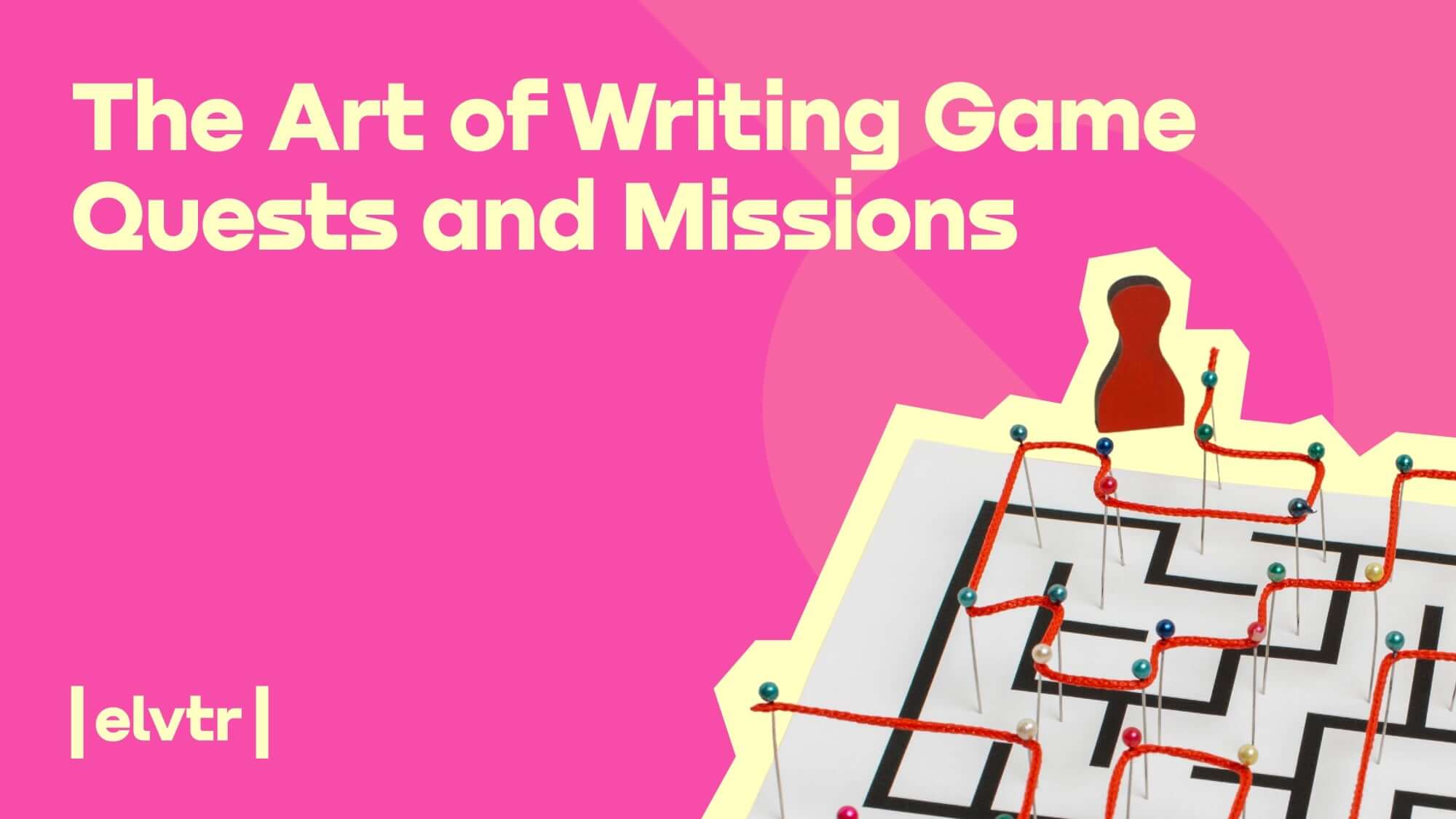- MAIN PAGE
- – elvtr magazine – THE ART OF WRITING GAME QUESTS AND MISSIONS
THE ART OF WRITING GAME QUESTS AND MISSIONS

We should start with the painful truth.
In the gaming industry, it’s all about the player experience. The plot and characters are still valuable, but gamers enjoy challenges more. They don’t care about the story if they cannot have fun and immerse themselves in the game world. That’s why game quests and missions are the key elements of a successful gaming experience that captivates millions of users for hours.
In this article, we will explain how to write game quests and missions to create more than just stories. Get ready to explore the backstage of creative game development and the challenges behind crafting gaming experiences.
What Makes Game Quests and Missions Captivating?
The combination and execution of these elements will vary depending on the game's genre, style, and target audience:
- Goals. Players need to understand what to do and how it aligns with the game world or character arcs. Clear objectives provide a sense of purpose, keeping players engaged and motivated to progress.
- Storytelling. A well-crafted narrative with interesting characters, plot twists, and meaningful choices can draw players into the game world and make them emotionally invested in the outcome. Immersive storytelling adds depth and resonance to the quests.
- Variety. They provide a mix of combat, exploration, puzzle-solving, or stealth activities, keeping the gameplay fresh and exciting. Well-balanced difficulty levels provide a sense of accomplishment and keep players engaged.
- Element of surprise. Incorporating unexpected twists, surprises, or memorable moments can greatly enhance the captivation factor of quests and missions.
- Rewards. Players should feel a sense of growth, whether through gaining experience points, unlocking new abilities, acquiring valuable items, or advancing the overarching story.
Game Writing VS Screenwriting
Writing for games might seem similar to screenplays. As any writer, you need to understand the basics of storytelling, character arc development, and dialogue writing. Overall, prior writing experience (including screenwriting) is a huge advantage for career switchers. But there is so much more than writing if you want to step into the game industry.
Here are the main differences:
- The idea doesn’t start with the writer. A game designer is in charge of the game idea and its mechanics. When a game writer starts working on game quests and missions, there are already some frames and concepts that define the final result.
- Teamwork is a priority. Game quests and missions are a product of collaboration. A game development team usually includes game designers, level designers, and narrative designers/writers. So be ready to engage with multiple people instead of leaving the creative flow only to yourself.
- You need to be tech-savvy. Understanding technical documentation and how your work is transformed into games will help you write faster and cope with your tasks better. You don’t need coding experience or a technical background, but knowing the main technical concepts will simplify your communication with programmers and designers.
- Revisions and changes are common. Being open to feedback and critique is crucial. Don’t take it personally. Sometimes, certain gaming experiences might look great in written form but they still need improvements after development.
- Gaming experience is a must. Creating non-linear narratives and engaging characters requires an understanding of the gaming experience. Playing games is essential if you work in the game industry. This part is actually so much fun, but you should also approach it professionally and analyze the details of each game you play. Pay attention to game difficulty, rewards, player choices.
Game Writing or Game Design?
Game writers and game designers typically work in one team and share some similar responsibilities.
Mostly, a game designer focuses on interactive gameplay and takes a helicopter view of a game. A game writer focuses on written content and storytelling.
Regarding the hierarchy, game designers are above game writers as they shape a game itself and its mechanics, while game writers deal with smaller, more specific tasks. Both professions can be exciting, and you can switch between them if you gain enough knowledge.
You can compare these roles using this table:
| Game Designers | Game Writers | |
| Main Focus | Mechanics, systems, gameplay | Storytelling, narrative, quests/missions |
| Responsibilities | Designing game mechanics, level layouts, progression | Crafting narratives, dialogue, character development |
| Core Expertise | Game design principles, mechanics, player experience | Storytelling, narrative structure, character arcs |
| Collaboration | Collaborate with artists, programmers, level designers | Collaborate with game designers, artists, programmers |
| Skills Needed | Creativity, problem-solving, analytical thinking | Writing skills, storytelling, narrative design |
| Technical Knowledge | Understanding of game engines, tools, mechanics | Familiarity with game development, tools, dialogue |
| Player Experience | Balancing challenge, engagement, game progression | Creating immersive narratives, player motivation |
| Iteration and Testing | Prototyping, playtesting, balancing mechanics | Playtesting, refining dialogue, narrative flow |
| Outcome | Player engagement, enjoyable gameplay experiences | Compelling stories, memorable quests/missions |
Let’s go back to game quests and missions. It is usually a result of collaboration between game designers and game writers.
Here’s what game designers do:
- Design the overall structure, mechanics, and gameplay systems.
- Define the objectives, challenges, and rewards.
- Determine the progression and pacing of quests.
Game writers’ tasks are slightly different:
- Craft the narratives, dialogue, and story elements.
- Create engaging quest descriptions, character dialogues, and narrative arcs.
- Design the overall structure and flow of quests, including the branching paths, choices, and variety of consequences.
If you want to dive into game writing, ELVTR has it all covered.
Unleash the magic of storytelling with our Game Writing course. You'll delve into the art of game writing and discover the secrets to crafting immersive quests and captivating narratives. With a friendly and supportive atmosphere, you'll explore the power of storytelling and learn how to breathe life into the game worlds you create.
As you know more about creating game quests and missions after reading this article, we hope you feel inspired to start creating your own. Remember, storytelling is the key to engaging players, so let your imagination run wild and craft exciting narratives.
Now, armed with newfound knowledge, it's time to begin your quest-making journey. Let your creativity shine and help you design games that players will cherish. Happy quest-making, and may your gaming adventures be legendary!

